Here’s how the provinces stack up with budget update season winding down
Article content
Tax and royalty windfalls are dwindling. The costs of wildfires and higher public service wages are piling up. The Canadian economy is slowing. In parts of the country, that means optimistic spring budgets are being left by the wayside, replaced by narrower surpluses or ballooning deficits. Other provinces are sticking by their projections, if barely. With the federal government poised to deliver a fall update of its own on Nov. 21, the Financial Post’s Gigi Suhanic rounds up the changing fiscal picture from coast to coast.
Advertisement 2
Article content
Ontario
Article content
Spring budget: $1.3-billion deficit
Latest update: $5.6-billion deficit
Ontario’s spring deficit numbers were revised higher in a fall economic statement released Nov. 2, with Finance Minister Peter Bethlenfalvy now projecting the province is on track for a deficit of $5.6 billion for 2023-2024, followed by $5.3 billion next year and a surplus of $500 million in 2025-2026.
The government said decelerating economic growth and lower revenues led to the revision, but noted that the province has also budgeted $2.5 billion to its contingency fund to help manage economic risk.
“High inflation and the Bank of Canada’s rapid interest rate increases are weighing on Ontario’s outlook for the remainder of this year and into the next,” Bethlenfalvy said.
RBC Economics said the deficit in public accounts, at $5.9 billion, is almost double what was expected in the spring.
“The latest projections represent a weaker outlook for the province’s indebtedness position. This risks leaving Ontario with less fiscal flexibility in the face of an unexpected shock,” RBC economist Rachel Battaglia said in a note on Nov. 2.
Advertisement 3
Article content
Quebec
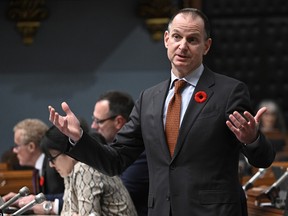
Spring budget: $4-billion deficit
Latest update: $4-billion deficit
Quebec Finance Minister Eric Girard stuck to his spring deficit projection in his Nov. 7 update, adding that he expects to reduce the deficit by $1 billion each fiscal year until the budget is balanced in 2027-2028.
Girard also maintained his growth forecast for 2023-2024 of 0.6 per cent but cut the projection for next year in half to 0.7 per cent from 1.4 per cent.
He said net debt to GDP is 37.9 per cent, up from 37.4 per cent in the spring budget.
“Thanks to fiscal flexibility it gained in years prior to the pandemic and additional federal transfers, (Quebec) is able to boost investment in affordable housing, climate transition efforts and other high priority items without jeopardizing its fiscal position,” Battaglia said in a note on Nov. 8. “Cuts to the contingency reserve, however, leave less room for unexpected shocks going forward.”
British Columbia

Spring budget: $4.2-billion deficit
Latest update: $6.7-billion deficit
The province broke with its spring deficit projection in an update released Sept. 27, citing factors including lower natural-gas royalties, reduced revenue from personal income tax and higher spending to fight wildfires.
Article content
Advertisement 4
Article content
B.C.’s resource revenue forecast fell $1.2 billion on a revision to natural gas price assumptions, Scotiabank economist Laura Gu said in a note on Oct. 31, accounting for half of the additional deficit projected for 2024. The current estimates, however, appear to be conservative.
“The current price forecast errs on the side of caution and leaves room for improvement,” Gu said.
According to the first quarter update, expenses are forecast to be higher by almost $1 billion, while personal tax revenue is projected to be lower by $1.7 billion.
Alberta

Spring budget: $2.4-billion surplus
Latest update: $2.4-billion surplus
For the current fiscal year, Alberta is expecting non-renewable resource revenue of $17.7 billion, down from the $18.4 billion projected in the spring budget.
Still, in the province’s fiscal first quarter update, released on Aug. 31, it projected a $500 million increase in revenue to $71.1 billion, due to higher-than-expected personal and corporate income taxes as the province continues to benefit from the latest boom in energy prices.
Alberta also revised its price assumption for West Texas Intermediate down to US$75 per barrel from US$79 for this fiscal year, a move Gu said was a sign of “prudent planning given the high sensitivity to oil prices.”
Advertisement 5
Article content
Alberta is expected to present its second-quarter update at the end of November.
Saskatchewan
Spring budget: $1-billion surplus
Latest update: $485.5-million surplus
Saskatchewan’s surplus projection shrank by a little more than $500 million, the province said in its first-quarter fiscal update on Aug. 31, as it contended with higher pension expenses and higher costs from fighting wildfires.
The province also said non-renewable resource revenue came in lower in the first quarter update versus the budget, “largely resulting from lower potash and oil prices and slower-than-budgeted production growth.”
Forecast revenue from non-renewable resources decreased $528.9 million from the budget.
At the time of the update, West Texas Intermediate, the U.S. oil benchmark, was forecast to average US$74.47 per barrel in 2023-24, down from US$79.50 in the budget.
A spokesman for Saskatchewan said in an email the province will release its second quarter update before the end of November.
Manitoba
Spring budget: $363-million deficit
Latest update: $363-million deficit
Advertisement 6
Article content
The Conservative government, which was replaced in October’s election by the New Democratic Party, stuck to its plan of providing financial relief to Manitobans in its first quarter fiscal update in July, including increasing the basic personal amount exempt from taxes to $15,000, adjusting tax brackets and increasing a school tax rebate for farms and residential properties.
New Brunswick
Spring budget: $40.3-million surplus
Latest update: $199.6-million surplus
Stronger-than-anticipated growth in the economy and a rising population brought in more tax revenue than expected, according to the province’s first quarter fiscal update in August, making New Brunswick one of the only provinces to see its fiscal position improve as the year has gone on.
Higher grant revenue and disaster financial assistance funding also helped boost the books and widen the province’s projected surplus for the year.
“The first-quarter updates released to date have modestly improved revenue forecasts for New Brunswick and Alberta,” said Gu, who noted that provinces with significant population growth could see it “contribute positively” to government finances.
Advertisement 7
Article content
New Brunswick will release it second-quarter fiscal update in November.
Nova Scotia
Spring budget: $279-million deficit
Latest update: $402.7-million deficit
In its September budget update, Nova Scotia said it is expecting an increase in expenses of $363.1 million for this fiscal year including costs from wildfire response, higher debt servicing costs and higher labour costs, including a new union contract with Nova Scotia’s nurses.
As a result, the projected provincial deficit was revised higher by more than 40 per cent to $402.7 million.
The province nevertheless reiterated its plan to invest $6.5 billion in healthcare, an increase of 21.8 per cent from two years ago.
Newfoundland and Labrador
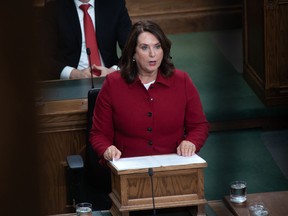
Spring budget: $160-million deficit
Latest update: $154-million deficit
The province said in it fiscal update on Oct. 31 that it is looking to balance its budget in 2024-2025.
While the deficit shrank slightly, N.L. said it could borrow up to $700 million more than initially planned in the budget. Meanwhile, it said it had spent more on debt to cover rising interest costs and on renegotiated collective agreements with public employees.
Advertisement 8
Article content
On the energy file, oil production was lower than projected mostly due to delays in restarting production in the Terra Nova oilfield, Finance Minister Siobhan Coady said. However, the province is expecting a boost to the sector’s prospects after it granted four companies the exclusive right to develop wind-powered hydrogen projects.
Prince Edward Island
Spring budget: $97.6-million deficit
P.E.I. released its budget on May 25, a bit later than the rest of the provinces, following an April election in which the province’s conservative government was re-elected.
Related Stories
-

Business between Canada and India continues despite tensions
-

Canada is skewing the data policymakers need
-

Bank of Canada deputy says ultra-low rates may not return
It forecast a deficit of $97.6 million for the fiscal year 2023-2024 and is calling for deficits in the next two fiscal years as it beefs up spending on healthcare and education.
It also forecasts net debt to rise from $2.5 billion in 2022-2023 to $3.2 billion in 2025-2026.
• Email: gmvsuhanic@postmedia.com
Bookmark our website and support our journalism: Don’t miss the business news you need to know — add financialpost.com to your bookmarks and sign up for our newsletters here.
Article content
Provinces feel the fiscal pinch as spring budget optimism fades
2023-11-13 17:06:33


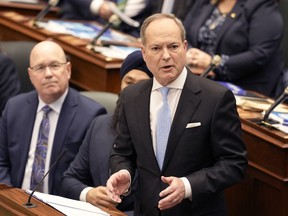



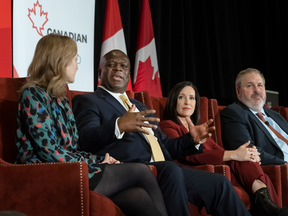
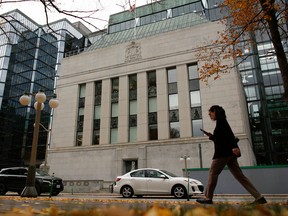

Comments
Postmedia is committed to maintaining a lively but civil forum for discussion and encourage all readers to share their views on our articles. Comments may take up to an hour for moderation before appearing on the site. We ask you to keep your comments relevant and respectful. We have enabled email notifications—you will now receive an email if you receive a reply to your comment, there is an update to a comment thread you follow or if a user you follow comments. Visit our Community Guidelines for more information and details on how to adjust your email settings.